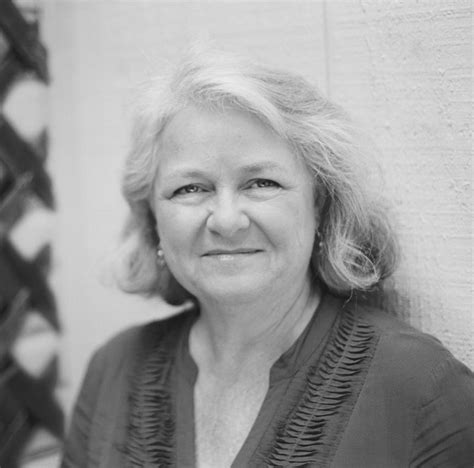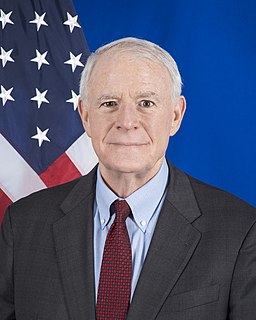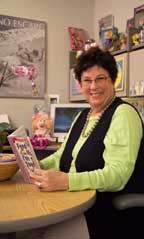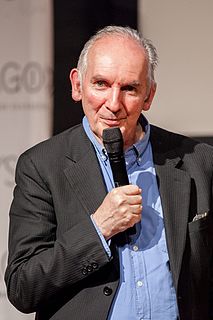A Quote by John Maeda
Art shows us that human beings still matter in a world where money talks the loudest, where computers know everything about us, and where robots fabricate our next meal and also our ride there.
Related Quotes
There are two gods. The god our teachers teach us about, and the God who teaches us. The god about whom people usually talk, and the God who talks to us. The god we learn to fear, and the God who speaks to us of mercy. The god who is somewhere up on high, and the God who is here in our daily lives. The god who demands punishment, and the God who forgives us our trespasses. The god who threatens us with the torments of Hell, and the God who shows us the true path.
There are two gods. A god who casts us off because of our sins, and a God who calls to us with His love.
And last of all we have the secondary forms of crystals bursting in upon us, and sparkling in the rigidity of mathematical necessity and telling us, neither of harmony of design, usefulness or moral significance, nothing but spherical trigonometry and Napier's analogies. It is because we have blindly excluded the lessons of these angular bodies from the domain of human knowledge that we are still in doubt about the great doctrine that the only laws of matter are those which our minds must fabricate, and the only laws of mind are fabricated for it by matter.
Social media puts us inside our phones and our computers and our headphones, and we're not connecting so much with our outside environment. Even when people go to the Grand Canyon they're more concerned about the selfies than actually looking at the canyon. I see it with my own kids - the addiction to needing things fast, never pausing to just see what's around us and connect with our fellow human beings in real time.
Back in the twentieth century, we thought that robots would have taken over by this time, and, in a way, they have. But robots as a race have proved disappointing. Instead of getting to boss around underlings made of steel and plastic with circuitry and blinking lights and tank treads, like Rosie the maid on The Jetsons, we humans have outfitted ourselves with robotic external organs. Our iPods dictate what we listen to next, gadgets in our cars tell us which way to go, and smartphones finish our sentences for us. We have become our own robots.
As we live our human lives, let us be like the water. Let us be conscious of the flow. Let us not forget the great ground of being that draws us on through life. Let us live in a knowing hope, aware that all being is in transition, that all movement is back to the source. Let us treat those around us as reminders of our illusionary individuality. We know that they are us and we are them connected in ways we cannot fathom. Let us grow in compassion for all beings, for they share our journey.
Chess is a unique battlefield for human minds and computers - human intuition, our creativity, fantasy, our logic, versus the brute force of calculation and a very small portion of accumulated knowledge infused by other human beings. So in chess we can compare these two incompatible things and probably make projections into our future. Is there danger that the human mind will be overshadowed by the power of computers, or we can still survive?
I call the years when our children are between six and twelve the "golden years," not because everything's perfect . . . but because the kids are capable and independent. . . . They're becoming fascinating human beings who continually astound us and make us laugh. And they build our self-esteem. They still adore us for the most part, not yet having reached that age of thinking everything we do is dumb, old-fashioned and irrelevant.
We human beings are not only the beneficiaries but also the stewards of other creatures. Thanks to our bodies, God has joined us so closely to the world around us that we can feel the desertification of the soil almost as a physical ailment, and the extinction of a species as a painful disfigurement. Let us not leave in our wake a swatch of destruction and death which will affect our own lives and those of future generations.
We must embrace our differences, even celebrate our diversity. We must glory in the fact that God created each of us as unique human beings. God created us different, but God did not create us for separation. God created us different that we might recognize our need for one another. We must reverence our uniqueness, reverence everything that makes us what we are: our language, our culture, our religious tradition.
No matter what part of the world we come from, we are all basically the same human beings. We all seek happiness and try to avoid suffering. We have the same basic human needs and concerns. All of us human beings want freedom and the right to determine our own destiny as individuals and as peoples. That is human nature.
The power of both myth and art is this magical ability to open doors, to make connections - not only between us and the natural world, but between us and the rest of humanity. Myths show us what we have in common with every other human being, no matter what culture we come from, no matter what century we live in. . .and at the same time, mythic stories and art celebrate our essential differences.
Our God, who art our winged self, it is thy will in us that willeth.
It is thy desire in us that desireth.
It is thy urge in us that would turn our nights, which are thine, into days which are thine also.
We cannot ask thee for aught, for thou knowest our needs before they are born in us:
Thou art our need; and in giving us more of thyself thou givest us all.
We are on the earth, and they tell us of heaven; we are human beings, and they tell us of angels and devils; we are matter, and they tell us of spirit; we have five senses whereby to admit truths, and a reasoning faculty by which to build our belief upon them; and they tell us of dreams dreamed thousands of years ago, which our experience flatly contradicts.








































